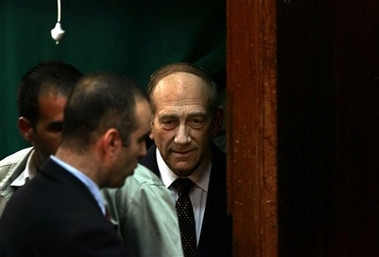JERUSALEM - Israel's prime minister declared Monday that there would be no
cease-fire with Hezbollah guerrillas, apologizing for the deaths of Lebanese
civilians but saying "we will not give up on our goal to live a life free of
terror." His Security Cabinet approved widening the ground offensive.

Israeli Prime Minister
Ehud Olmert arrives at a conference in Tel Aviv, Israel, Monday, July 31,
2006. Olmert apologized Monday for the dozens of civilians killed in an
Israeli airstrike in the Lebanese town of Qana, but said that no
cease-fire would be forthcoming in Israel's 20-day battle with Hezbollah
guerrillas in southern Lebanon. [AP] |
Israeli warplanes hit Hezbollah fighters battling with soldiers near the
border as the guerrillas fired mortars into Israel. But an Israeli suspension of
most airstrikes in Lebanon, and a pause by the guerrillas on rocket attacks in
northern Israel brought both countries their quietest day since the conflict
began three weeks ago.
Lebanese fled north in overflowing trucks and cars. About 200 people, mostly
elderly escaped the border town of Bint Jbail, where Israeli troops and
Hezbollah guerrillas fought their bloodiest clashes. Two residents dropped dead
on the road out, one of malnutrition, the other of heart failure.
Some survivors described living on a piece of candy a day and dirty water as
the fighting raged.
"All the time I thought of death," said Rimah Bazzi, an American visiting
from Dearborn, Mich., who spent weeks hiding with her three children and mother
in the house of a local doctor.
The lull was felt across northern Israel, too: In the town of Nahariya,
residents who had been hiding in shelters for the better part of three weeks
began emerging. Supermarkets were fuller than before and more people were in the
streets, walking along the beach and shopping.
But diplomatic efforts to end the crisis faltered, despite increased world
pressure for a cease-fire after the devastating strike in Qana.
Israel's Security Cabinet early Tuesday approved widening the ground
offensive, a participant said, and rejected a cease-fire until an international
force is in place in southern Lebanon.
The participant, speaking on condition of anonymity because he was not
authorized to talk to reporters, said Israel's airstrikes would resume "in full
force" after a 48-hour suspension expires in another day.
Thousands of army reserves have been called up in recent days in advance of
the decision, which is expected to lead to sending more troops into the border
area. Israeli leaders have said they want to carve out a zone about 1 mile wide
that would be free of Hezbollah.
Israel called the 48-hour suspension after the Qana attack to give time for
an investigation, though it said its warplanes would still hit urgent Hezbollah
targets, and at least three strikes took place Monday.
Israeli Prime Minister Ehud Olmert apologized for the civilian deaths in
Saturday's strike, in which 56 people, mostly women and children, were killed.
"I am sorry from the bottom of my heart for all deaths of children or women
in Qana," he said. "We did not search them out. ... They were not our enemies
and we did not look for them."
But he insisted Israel, which began its offensive after Hezbollah snatched
two soldiers and killed three others in a cross-border raid July 12, had no
choice but to fight.
"There is no cease-fire, there will be no cease-fire," he said. "We are
determined to succeed in this struggle. We will not give up on our goal to live
a life free of terror."
Near the fighting, grass fires set by shelling blazed into the night sky from
the hills outside the Lebanese border town of Marjayoun. U.N. peacekeepers
struggled to get trucks full of aid supplies across the Litani River as
artillery pounded only a few hills away.
President Bush resisted calls for an immediate halt to fighting, underlining
that any peace deal must ensure that Hezbollah is crippled. He said Iran and
Syria must stop backing the Shiite militant group with money and weapons.
"As we work with friends and allies, it's important to remember this crisis
began with Hezbollah's unprovoked attacks against Israel. Israel is exercising
its right to defend itself," Bush said.